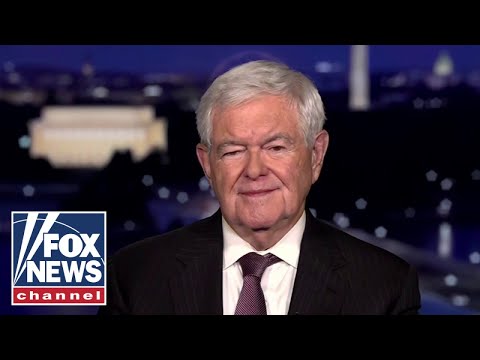## Newt Gingrich: A Lesson Taught in the Middle East? Dissecting Trump’s Iran Policy on Hannity
Former House Speaker Newt Gingrich’s recent appearance on Sean Hannity’s Fox News show sparked a flurry of discussion regarding President Donald Trump’s approach to the complex Israel-Iran conflict. Gingrich’s bold claim – that the Trump administration “taught the world a lesson” – warrants a closer look. This blog post will delve into the context of his statement, exploring the potential interpretations and the broader implications of Trump’s Middle East policy.
**The Context: A Hannity Interview**
The interview, as highlighted in the video description, aired on Fox News’ highly-rated Hannity program. This context is crucial. Hannity is known for his conservative viewpoints, and the show often features guests who share a similar political perspective. Understanding this inherent bias is essential for critically evaluating Gingrich’s assertions. The interview itself likely focused on a specific aspect of Trump’s foreign policy, potentially emphasizing particular successes while downplaying potential drawbacks or criticisms.
**Gingrich’s Claim: “We Taught the World a Lesson”**
The core of the discussion revolves around Gingrich’s claim that the Trump administration imparted a significant lesson to the world through its handling of the Iran conflict. This statement is open to multiple interpretations. Did Gingrich refer to:
* **Maximum Pressure Campaign:** The Trump administration’s strategy of imposing stringent sanctions on Iran to curb its nuclear ambitions and regional influence? Supporters might point to Iran’s economic struggles as evidence of the campaign’s effectiveness. Critics, however, would argue that the sanctions have harmed the Iranian people without achieving a lasting solution.
* **Abraham Accords:** The normalization agreements between Israel and several Arab nations brokered by the Trump administration? These accords are undoubtedly a significant diplomatic achievement, potentially reshaping the geopolitical landscape of the Middle East. But the agreements’ long-term impact and their potential to resolve underlying conflicts remain to be seen.
* **Military Deterrence:** The Trump administration’s assertive military posture in the region, including targeted strikes and increased military presence? This approach might be seen as successful in deterring certain actions by Iran, but it also carries the risk of escalating tensions and potentially leading to larger-scale conflict.
**Beyond the Soundbite: Analyzing the Nuances**
Gingrich’s statement, while provocative, lacks specific detail. To understand the true meaning and implications, we need to go beyond the soundbite and consider the broader context of Trump’s Middle East policy. This involves analyzing both its successes and failures, weighing the short-term gains against the potential long-term consequences. Further research into specific events and their repercussions would provide a more nuanced understanding of Gingrich’s assertions.
**Fox News: A Powerful Platform**
The fact that the interview aired on Fox News, a dominant force in cable news, further emphasizes the importance of media literacy. As the video description highlights Fox News’ consistently high ratings and claims of trustworthiness, it’s vital to acknowledge the channel’s inherent political leanings. This doesn’t invalidate the information presented, but it encourages viewers to approach the information with a critical and discerning eye, seeking out multiple perspectives to gain a complete picture of the issue.
**Conclusion: A Complex Issue Demands Critical Examination**
Newt Gingrich’s statement about “teaching the world a lesson” is a bold claim that requires careful consideration. The Trump administration’s Middle East policy was undoubtedly complex and multifaceted, with both successes and failures. To truly assess its impact and Gingrich’s assertion, a thorough examination of the relevant facts, coupled with an awareness of the inherent biases present in the media landscape, is essential. The issue remains open to debate and deserves continued critical analysis.


